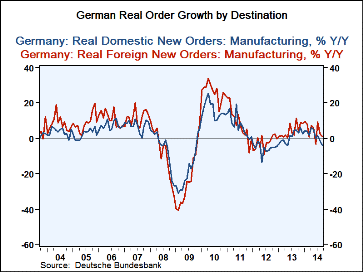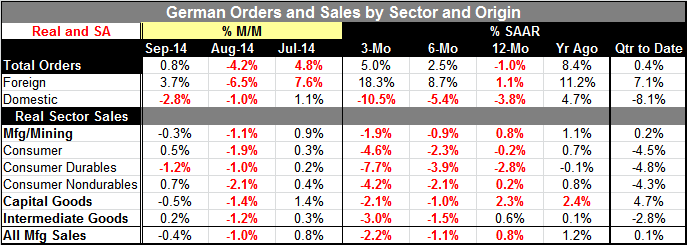 Global| Nov 06 2014
Global| Nov 06 2014Europe's Locomotive Gets a Push from Foreigners
Summary
The German economy is often viewed as the strong man of Europe. But in September, the strong man needed some help picking himself up. Overall German industrial orders rose by 0.8% in September. Orders advanced on the strength of the [...]
 The German economy is often viewed as the strong man of Europe. But in September, the strong man needed some help picking himself up. Overall German industrial orders rose by 0.8% in September. Orders advanced on the strength of the foreign sector where orders rose by 3.7%. That rise more than offset a 2.8% drop in domestic orders. Domestic orders are weaker than foreign order growth over six months and over 12 months as well as in their 12-month gain one year ago. The German economy has not been driving Europe, rather Europe and other economies have been driving Germany whose economy remains in Europe's cat-bird seat.
The German economy is often viewed as the strong man of Europe. But in September, the strong man needed some help picking himself up. Overall German industrial orders rose by 0.8% in September. Orders advanced on the strength of the foreign sector where orders rose by 3.7%. That rise more than offset a 2.8% drop in domestic orders. Domestic orders are weaker than foreign order growth over six months and over 12 months as well as in their 12-month gain one year ago. The German economy has not been driving Europe, rather Europe and other economies have been driving Germany whose economy remains in Europe's cat-bird seat.
The breakdown of the orders show that orders from within the euro area are up by 2.5% on the previous month, far better than the 2.8% drop in Germany's own orders. New orders from outside the euro area are even stronger, rising by 4.4%. Far from being an engine of growth, the German economy has been the luxury car secured in the middle of the train driven by others, while Germany enjoys its free ride.
German sales data showed declines in real sector sales in September in mining and manufacturing with consumer good sales up on the back of nondurables. Durable goods sales fell by 1.2% in September. Capital goods sales fell by 0.5% in September, while intermediate goods rose by 0.2%. Manufacturing by itself, saw real sector sales fall by 0.4%.
Returning to the growth rates of the sectors over three-months, six-months and 12-months, we see negative growth rates everywhere with the exception of intermediate goods' real sector sales over 12 months. In addition to that, the growth rates' decline over three months is greater than it is over six months for all sectors; moreover, the six-month pace of decline is faster than the 12 month decline for all sectors as well. Real sector sales confirm that German sales are steadily declining and their decline has been accelerating. Now we see that orders are being supported mostly by the foreign sector.
The continuing decline in the euro will help Germany to lean heavily on its foreign orders. A weaker euro will make German products even cheaper outside of the euro area; Germany will retain its price advantage within the euro area since that is altered only by inflation differentials which are changing very slowly. The European economy continues to struggle. Policy continues to focus on the European Central Bank, which held its policies steady this month, as expected. However, oil prices continue to slide, and that's going to be a problem for the ECB as well of the Federal Reserve as both are trying to hit inflation targets and both are missing them. It's not clear in this environment how much that containing `miss' will hurt either of the central banks' credibility with markets.

Robert Brusca
AuthorMore in Author Profile »Robert A. Brusca is Chief Economist of Fact and Opinion Economics, a consulting firm he founded in Manhattan. He has been an economist on Wall Street for over 25 years. He has visited central banking and large institutional clients in over 30 countries in his career as an economist. Mr. Brusca was a Divisional Research Chief at the Federal Reserve Bank of NY (Chief of the International Financial markets Division), a Fed Watcher at Irving Trust and Chief Economist at Nikko Securities International. He is widely quoted and appears in various media. Mr. Brusca holds an MA and Ph.D. in economics from Michigan State University and a BA in Economics from the University of Michigan. His research pursues his strong interests in non aligned policy economics as well as international economics. FAO Economics’ research targets investors to assist them in making better investment decisions in stocks, bonds and in a variety of international assets. The company does not manage money and has no conflicts in giving economic advice.






